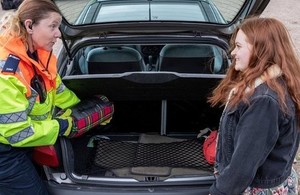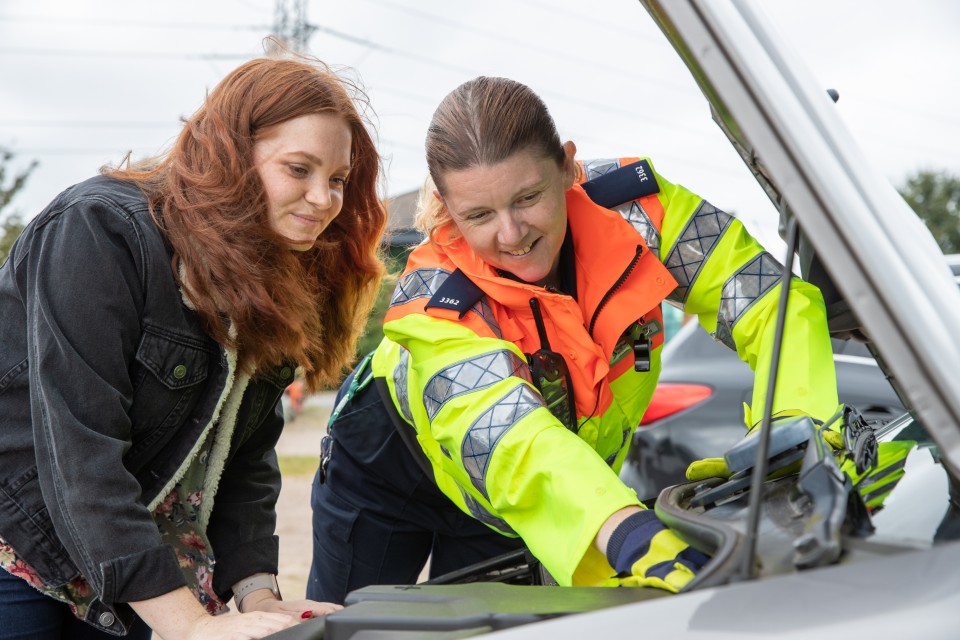Student drivers urged to lighten up before taking to the road as Freshers’ season starts
New research suggests over half of students would potentially drive an overloaded car. Data shows 7 out of 10 students have driven while tired.

Highways England traffic officer Kelly Rudge offers loading advice to Shelby Thomas from Birmingham City University
Students are reminded to make sure they have loaded their vehicle correctly and carried out basic vehicle checks before setting off to college or university this Freshers’ season.
Freshers’ week is a rite of passage for many new students, providing an opportunity to make friends and let the hair down before lectures start.
Highways England is urging those travelling away to study for the first time to make sure they don’t overload their vehicle and to avoid getting behind the wheel while tired.
New research by the organisation responsible for running England’s major A-road and motorway network shows 6 out of 10 students would carry on driving, even if they may have overloaded their car. The data also shows that 7 out of 10 students have driven while tired.
The information comes after Highways England surveyed more than 1,400 students ahead of Freshers season starting.
With many young people likely to be moving away from home to university accommodation, Highways England is calling on students to ‘check it before driving it’ and says people should avoid packing everything but the proverbial ‘kitchen sink’.
Richard Leonard, head of road safety at Highways England, said:
We want everyone to get to their destination safely and we can all play a part in that. We know that this is an incredibly exciting time for students with many leaving home for the first time.
Our traffic officers are there to help get things moving if there’s a problem. But we’d urge all students to make sure they load their car correctly before setting off as they could be endangering themselves and other road users.
Advice for loading vehicles correctly includes:
- place heavy luggage on the boot floor, directly behind the rear seat backrest so that it can’t move or fall over in to the free space
- put light luggage on top of the large cases and cover it with a blanket and secure it all with a strap otherwise loose objects can turn into dangerous projectiles, especially if the luggage exceeds the height of the rear seat
- heavy luggage can be safely stored in the space between the front and rear seats
- store small and light objects that you do not necessarily need while driving behind the front seat or in vacuum bags which fit neatly into the storage space under the seats
- put anything particularly heavy in the boot and not unrestrained on the back seat and secure the load if carrying anything externally on the car eg a roof box or bike
- drivers should still be able to see in their mirrors when driving
- if people aren’t sure about the car’s official weight limit they should check their handbook. If they feel they are close to the limit they can go to a weighbridge to check
- drivers should make sure they have the right insurance, especially if using other people’s vehicles and are sharing the driving or towing a trailer
Highways England traffic officer Kelly Rudge is keen all students take time to make sure their vehicles are loaded properly and are ready to take to the road. Kelly said:
It’s really important that students check their vehicle before setting off and to make sure that they don’t overload them as it could cause serious danger to themselves and other motorists.
Simple things like putting heavy loads in the boot and keeping loose items inside the car secured can all help to keep the occupants safe if the vehicle comes to a sudden stop. The last thing anyone wants is to be hit by an object that isn’t secure.
Birmingham City University student Shelby Thomas, aged 20, often drives to university in the city. The third-year Criminology and Security Studies student is backing Highways England’s calls to make sure students carry out vehicle checks. She said:
It’s really important that students check their car over before setting off and if they’re unsure of something then get a parent or experienced person to check the car. It’s important that it’s fit to drive.
I do worry about overloading the car but after speaking with Highways England traffic officer Kelly Rudge, I’m much more aware of how to do it safely and the dangers of not getting it right. Now, if I need to transport lots of items, I’ll check the handbook to make sure the weight is okay, or I’ll get someone experienced to tell me if I have put too much in the car. If I need to do more than one journey, I’d rather do that than cram it all into the car and risk causing a problem.
And with data showing that 7 in 10 students have admitted to driving while tired, Shelby is also urging her fellow students to think twice before getting behind the wheel if they’re all partied out from the night before. She added:
If anyone is tired, just get someone else to drive. It’s much easier to get a friend to take you where you need to go rather than risking your own life and others by getting behind the wheel while tired.

Highways England traffic officer Kelly Rudge checks engine oil with student Shelby Thomas.
Highways England also recently launched a safety campaign encouraging drivers to remember the basics of motorway driving, including what to do if you break down.
Adverts on radio, billboards and online reminded drivers of simple driving rules to help keep everyone moving.
Around a quarter of breakdowns are caused by punctures or other tyre issues. Vehicles running out of fuel and engines overheating are also other common reasons for breakdowns on motorways.
More advice:
General enquiries
Members of the public should contact the Highways England customer contact centre on 0300 123 5000.
Media enquiries
Journalists should contact the Highways England press office on 0844 693 1448 and use the menu to speak to the most appropriate press officer.